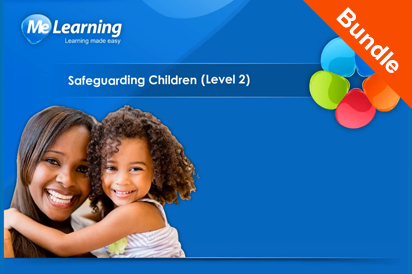

This Safeguarding Children (Levels 1 and 2) course is intended for everyone who makes or who could potentially make onward safeguarding referrals to the police and Children’s Social Care.

This course contains the following modules:
| Module name | Type | Duration |
|---|---|---|
| Background to safeguarding children | Online | 00:15:00 |
| Introduction to child abuse | Online | 00:20:00 |
| Recognising abuse and neglect | Online | 00:45:00 |
| If you have concerns | Online | 00:20:00 |
| Responding to a disclosure: what you should do | Online | 00:20:00 |
| Responding to a disclosure: how to ask questions | Online | 00:15:00 |
| Referring safeguarding concerns | Online | 00:15:00 |
| Recognising and avoiding dangerous safeguarding practice | Online | 00:30:00 |
| Chronologies | Online | 00:15:00 |
This Safeguarding Children (Levels 1 and 2) course is intended for staff who fall into the following work groups:
Group 3: Members of the workforce who work predominantly with children, young people and/or their parents/carers and who could potentially contribute to assessing, planning, intervening and reviewing the needs of a child and parenting capacity where there are safeguarding concerns.
Group 4: Members of the workforce who make onward safeguarding referrals to the police and Children’s Social Care.
Group 5: Members of the workforce who have particular responsibilities in relation to undertaking section 47 enquiries, including professionals police and children’s social care; those who work with complex cases and social work staff responsible for co-ordinating assessments of children in need.
This course will enable you to:
Here are some of the topics covered in this course:
Everyone saw Victoria suffering but no one saved her | Serious case reviews | Every Child Matters and the Children Act 2004 | Children’s Trusts and LSCB’s | Baby P (Peter Connelly) | The Munro report | Revision and streamlining of the legislation | Working Together to Safeguard Children | Local Safeguarding Children Boards (LSCB) | LSCB: core functions | What is meant by safeguarding? | Who is responsible for safeguarding children? | Some facts and myths | What are we safeguarding children from? | Definition of child abuse | Definition of significant harm | Parenting and abuse | How to establish whether there is significant harm | The role of Children’s Social Care | Is there really a problem? | Myths on how to treat children | Who abuses children? | Forms of abuse | Indicators of abuse | Children’s response to abuse | Safeguarding: important principles | Causes of physical abuse | Signs from the victim and Signs form the abuser | Effects on children | Definition of emotional abuse | Causes of emotional abuse | Components of emotional abuse | Signs of emotional abuse | Signs from the abuser | Emotional abuse during childhood | Myths of sexual abuse | Grooming | Signs of sexual abuse | Signs from the abuser | Disclosure | Cause of neglect | Signs of neglect | Signs from the abuser | Asking questions | Attempt to resolve? | Making Promises? | Discuss with colleagues? | Can you wait? | Keeping good records | Concerns about a colleague? | What children fear | What children want | Types of disclosure | Safety first and avoiding promises | Listen carefully | Do not interrogate | Communicate appropriately | Actions to avoid | Actions to undertake | Closed Questions | Acceptable closed questions | Open questions | Open questions for young children | Avoid “why” | TED questions | Tell me questions | Multiple questions | Leading questions | Leading questions: assumptions | Limiting questions | Referral pathways | Information review | Seek advice? | Gather evidence? | Seeing the child? | Suggestion of risk | Inform the child? | Inform the parents? | Information gathering | Before the referral | Framework for assessments | Taking the referral | Ask questions | Referral outcomes | Partnership | Referral decision | Khyra Ishaq | Identifying risks | What is a chronology? | What is the purpose of a chronology? | When should a chronology be started? | Recording a chronology | Significant events | Examples of significant events | Professional judgement | Positive factors | Involving the family | How should a chronology be used? | Background to the framework for assessments | Who should use the assessment framework? | Assessment framework dimensions and domains | Child development | Assessing developmental needs | Assessing parenting capacity• Caregivers and the dimensions of parenting capacity | Family and environmental factors | Multiple caregivers | Safeguarding and child protection | Strategy discussion | Strategy discussion outcomes | Initiating section 47 enquiries | Court orders | Outcome of section 47 enquiries | Arrangement of the initial child protection conference | Initial child protection conference | The conference outcome | Outline child protection plan | Core group membership | Core group meetings | Arrange first child protection review conference | Child protection review conference | Discontinuing the child protection plan | Summary of child protection workflow
To access any of the courses you will need to login. If you do not have an account you will need to self-register for login details.
Please click the link to download the course flyer.